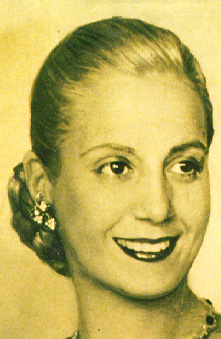CSPE Links
 Timor
Timor
 Cuba
Cuba
 Global Warming
Global Warming Africa I
Africa I  Argentina
Argentina  The Courts
The Courts  US Presidency
US Presidency  ASTI Strike
ASTI Strike  Attack
on America
Attack
on America
Night after night Evita scrutinised their visitors to see which camp they were from. This was the first thing she learned about politics; to be on guard on Perón's behalf, ready to attack before any threat had materialised.

 Little Eva (Evita) was the youngest of five children brought up in poverty. Her mother was the mistress of a wealthy landowner who had his own three children. Although the children had the last name of their real father, Duarte, the town still looked upon the children as bastards. When their father was killed in a car crash in 1920 the family were not allowed attend the funeral.
Little Eva (Evita) was the youngest of five children brought up in poverty. Her mother was the mistress of a wealthy landowner who had his own three children. Although the children had the last name of their real father, Duarte, the town still looked upon the children as bastards. When their father was killed in a car crash in 1920 the family were not allowed attend the funeral.When she was 15, Eva was given a small part in a school play, an emotional, flag waving melodrama. After that experience Eva vowed to become a great actress and leave her poor background behind forever. To do that she would have to go to Buenos Aires. She had no money to get there and no one to help her realise her dream. Not long after that the 15 year old Eva went to see a handsome tango singer, at the local theatre in her hometown. When the singer finished his performance that evening he found the 15 year old Eva Duarte waiting for him in his dressing room. The next evening after the show, Eva was driving in a car on her way to Buenos Aires.
Eva moved into the neighbourhood which would be the equivalent to New York's Broadway area. She took a room at a cheap hotel and got a few small parts acting but didn't really get anywhere. She was desperate and was willing to do anything, including prostitution to fulfil her dreams. She had a succession of lovers which aided her in getting better parts in the theatre. Survival and hunger can be a powerful factor in allowing one to trade favours of sex for better acting roles. Soon the roles came flowing her way. Films, radio shows and modelling made her well-known and prosperous.
On January 15, 1944 an earthquake almost completely destroyed the town of San Juan, 500 miles west of Buenos Aires. Thousands were killed and a tremendous wave of sympathy and calls for aid for the victims went through the country. Eva was asked to appear at a national radio show which was a benefit charity for the victims. Back stage, amongst the actors, singers and radio stars were the elite of the Argentine military including Colonel Juan Domingo Peron. He was the leader among the colonels who controlled the military government. Eva asked to be introduced to the handsome colonel and when they shook hands, Eva never let go.
1944 and 1945 were the years of Peron's increasing power within the government, but they were also years of growing hostility to him inside and outside the Army. Even when he became Vice-President in January 1945, his position was not assured and there were incessant plots and counter-plots as the struggle for power within the government continued. In political life, as Peron's importance grew, the question increasingly became: was one for Peron or was one against him? Night after night Evita scrutinised their visitors to see which camp they were from. This was the first thing she learned about politics; to be on guard on Perón's behalf, ready to attack before any threat had materialised. Juan Peron supported the Nazis during World War II which in 1945 was proving to be a bad move. He had not yet married Evita and rumours began to circulate about her past numerous lovers. Eventually the Army forced Juan Peron to resign. Shortly afterwards he was arrested.
Evita did not take this lying down. She rang around whipping up support from loyal army people and trade union officials. Hundreds of thousands took to the streets demanding his return to office. Massive public support granted this wish and he eventually married Evita. Eva was at her husband's side as he campaigned for president in 1946. Riding high on the worker's support of him Peron won the election by a landslide. On June 4, 1946, he became the 29th president of Argentina. Eva was enjoying her new role as First Lady of Argentina. Suddenly she had the power to do things that she only dreamed of. She did a huge amount of charity work which made her very popular with poor people. However, the economy began to suffer and Juan Peron dealt severely with critics.
Juan would need his wife's support more than ever in 1951 as he ran for re-election. She was as always eager to help, but this time she asked him for something in return. Evita wanted to be vice president of Argentina. The Army could take no more and threatened to seize power if Eva became Vice-President. Reluctantly she had to step down. However, her health had been failing for a long time. She had developed cancer and eventually died aged 33 in 1952. The country went into mourning for weeks. She was truly loved by the people. With Evita out of the way the Army seized power overthrowing Peron who fled to Spain.

Evita still lives today on Broadway and on film. Her name still brings questions from people who want to know more. Her biggest fear was being forgotten. That fear will never be a reality.


Evita

Maradona

Juan Peron